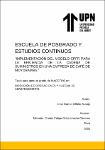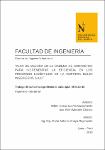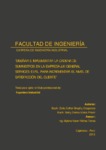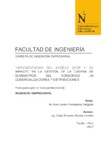Mostrar el registro sencillo del ítem
Implementación del modelo CPFR para la eficiencia de la cadena de suministros en una empresa de café de Moyobamba
| dc.contributor.advisor | Culquichicón Cáceres, Carlos Felipe | |
| dc.contributor.author | Villalta Araujo, Jose Carlos | |
| dc.date.accessioned | 2022-10-26T23:39:14Z | |
| dc.date.available | 2022-10-26T23:39:14Z | |
| dc.date.issued | 2022-08-22 | |
| dc.identifier.citation | Villalta, J. C. (2022). Implementación del modelo CPFR para la eficiencia de la cadena de suministros en una empresa de café de Moyobamba [Tesis de maestría, Universidad Privada del Norte]. Repositorio de la Universidad Privada del Norte. https://hdl.handle.net/11537/31609 | es_PE |
| dc.identifier.other | 658.7 VILL 2022 | es_PE |
| dc.identifier.uri | https://hdl.handle.net/11537/31609 | |
| dc.description.abstract | La presente investigación abordó la implementación del modelo: Planificación, Previsión y Reabastecimiento Colaborativo (CPFR) en una empresa de café de Moyobamba y así determinar el impacto del modelo en la eficiencia de la cadena de suministros. Mediante los indicadores propuestos en este estudio se obtuvo, como línea base, resultados de gestión en el año 2021, en el cual se pudo identificar problemas en cuanto al cumplimiento de la demanda solicitada por los clientes; estos a su vez ocasionaron perjuicios en la eficiencia de los procesos de aprovisionamiento, inventario, almacenamiento, producción y nivel de servicio. Para mencionar algunos resultados de gestión, indicadores como el fill rate, pérdida de ventas, niveles de rechazo de materia prima a proveedores y calidad de producción, entre otros; en el año 2021 se obtuvo como resultados: 84.5% 15.5%,7.5% y 97.5% respectivamente; resultados que, según los objetivos de la empresa de café no se alineaban a las estrategias de crecimiento y dificultaba los esfuerzos para hacer frente a un mercado mucho más dinámico y creciente en los últimos años. A esta problemática el estudio planteado propuso como objetivo general, evaluar el impacto de la implementación del modelo CPFR en la eficiencia de la cadena de suministros de la empresa de café respecto a un cliente previamente seleccionado; de igual importancia, se planteó cuatro objetivos específicos orientados a determinar la eficiencia de la cadena de suministros previo al despliegue del modelo, implementar el modelo en el cliente seleccionado, determinar la eficiencia de la cadena de suministros posterior a la implementación del modelo y finalmente, determinar el costo – beneficio de la implementación. Mediante una metodología de investigación con enfoque aplicativo – cuantitativo, con nivel de investigación explicativo y diseño de investigación tipo pre – experimental, longitudinal prospectivo; se pudo, en un periodo de cuatro meses, entre enero y abril del presente año, implementar el modelo CPFR en la gestión de la cadena de suministros de la empresa de café respecto a un cliente definido para las actividades colaborativas. Los resultados obtenidos demuestran una notable mejoría en relación a la línea base; tomando en cuenta los indicadores mencionados en el párrafo anterior, los resultados obtenidos fueron los siguientes: 98.20%, 1.8%, 2.1% y 98.1% para los indicadores fill rate, pérdida de ventas, nivel de rechazo de materia prima y calidad de producción; también se debe mencionar que el nivel de ventas en el periodo de análisis, comparado con el año anterior, creció en más de 39% y los gastos incurridos y perdida de ventas producto de una inadecuada gestión de la eficiencia de la cadena de suministros se redujo en un 67.16%, al pasar de 26.48 % en el año 2021 (enero a abril) a un 8.70% en el mismo periodo. Estos resultados permiten demostrar que la implementación del modelo CPFR impacta de forma positiva en la eficiencia de la cadena de suministros de la empresa de café. | es_PE |
| dc.description.abstract | The present investigation addresses the implementation of the model: Collaborative Planning, Forecasting and Replenishment (CPFR) in the coffee company of Moyobamba and thus will be able to determine the impact of the model on the efficiency of the supply chain. Through the indicators proposed in this study, management results were obtained as a baseline in 2021, in which identified problems which arose could be identified in terms of meeting the demand requested by customers; These problems, in turn, caused damage in terms of efficiency in the supply, inventory, storage, production and service level processes. Some management results were indicators such as the fill rate, loss of sales, levels of rejection of raw material to suppliers and production quality, among others; in the year 2021 the following results were obtained: 84.5% 15.5%, 7.5% and 97.5% respectively, results that, according to the objectives of the coffee company, were not aligned with the growth strategies and hindered the efforts to face a much more dynamic and growing market in recent years. The general objective was, to evaluate the impact of the implementation of the CPFR model on the efficiency of the study of the supply chain of the coffee company with respect to a previously selected client; Of equal importance, four specific objectives were proposed: determination of the efficiency of the supply chain prior to the study, implementation the model in the selected client, determination the efficiency of the supply chain after the implementation of the model and, finally, determination of the cost-benefit of the implementation. A research methodology was applied using an applicative-quantitative approach, with an explanatory level of research and a pre-experimental, prospective longitudinal research design. It was possible, in a period of four months, between January and April of this year, to implement the CPFR model in the management of the supply chain of the coffee company with respect to a defined client for collaborative activities. The results obtained show a notable improvement in relation to the baseline. Taking into account the indicators mentioned in the previous paragraph, the results obtained were the following: 98.20%, 1.8%, 2.1% and 98.1% for the indicators fill rate, lost sales, level of raw material rejection and production quality; It should also be mentioned that the level of sales in the period of analysis, compared to the previous year, grew by more than 39%, and the expenses incurred and lost sales due to inadequate management of the efficiency of the supply chain were reduced by 67.16%, going from 26.48% in 2021 (January to April) to 8.70% in the same period. These results allow us to demonstrate that the implementation of the CPFR model has a positive impact on the efficiency of the supply chain of the coffee company. | es_PE |
| dc.description.uri | Tesis | |
| dc.format | application/pdf | es_PE |
| dc.format | application/msword | es_PE |
| dc.language.iso | spa | es_PE |
| dc.publisher | Universidad Privada del Norte | es_PE |
| dc.rights | info:eu-repo/semantics/openAccess | es_PE |
| dc.rights | Atribución-NoComercial-CompartirIgual 3.0 Estados Unidos de América | * |
| dc.rights.uri | https://creativecommons.org/licenses/by-nc-sa/3.0/us/ | * |
| dc.source | Universidad Privada del Norte | es_PE |
| dc.source | Repositorio Institucional - UPN | es_PE |
| dc.subject | Logistica | es_PE |
| dc.subject | Administración de operaciones | es_PE |
| dc.subject | Control de inventario | es_PE |
| dc.subject | Modelo CPFR | es_PE |
| dc.subject | Cadena de suministros | es_PE |
| dc.subject | Eficiencia | es_PE |
| dc.subject | Supply Chain | es_PE |
| dc.subject | Efficiency | es_PE |
| dc.subject | Coffee | es_PE |
| dc.subject | Collaborative | es_PE |
| dc.title | Implementación del modelo CPFR para la eficiencia de la cadena de suministros en una empresa de café de Moyobamba | es_PE |
| dc.type | info:eu-repo/semantics/masterThesis | es_PE |
| thesis.degree.grantor | Universidad Privada del Norte. Escuela de Posgrado y Estudios Continuos | es_PE |
| thesis.degree.level | Maestro | es_PE |
| thesis.degree.discipline | Maestría en Dirección de Operaciones y Cadena de Abastecimiento | es_PE |
| thesis.degree.name | Maestro en Dirección de Operaciones y Cadena de Abastecimiento | es_PE |
| dc.publisher.country | PE | es_PE |
| dc.subject.ocde | https://purl.org/pe-repo/ocde/ford#2.11.04 | es_PE |
| thesis.degree.program | Posgrado | es_PE |
| dc.description.sede | Cajamarca | es_PE |
| renati.advisor.dni | 07795890 | |
| renati.advisor.orcid | https://orcid.org/0000-0003-3434-4402 | es_PE |
| renati.author.dni | 43796763 | |
| renati.discipline | 722117 | es_PE |
| renati.juror | Lujan Lopez, Jorge Eduardo | |
| renati.juror | Jungbluth Adrianzen, Luis Ernesto | |
| renati.juror | Cruzado Perez, William Moises | |
| renati.level | http://purl.org/pe-repo/renati/level#maestro | es_PE |
| renati.type | http://purl.org/pe-repo/renati/type#tesis | es_PE |
Ficheros en el ítem
Este ítem aparece en la(s) siguiente(s) colección(ones)
-
Tesis [76]








